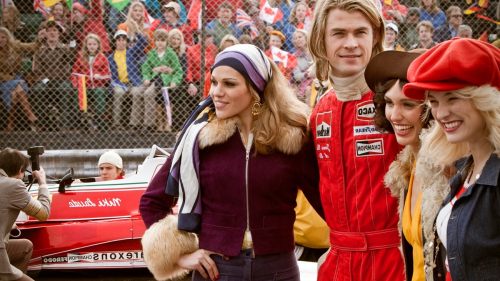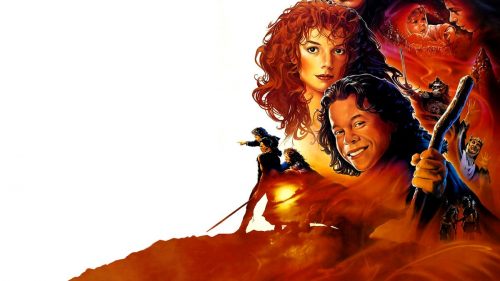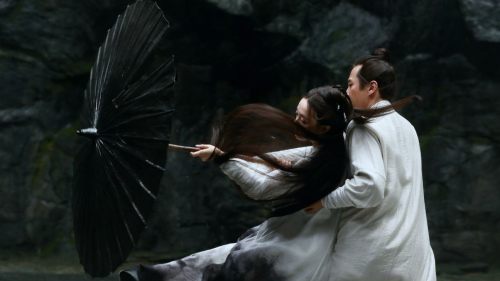The Bulldog Of Bergen, The Pride Of New Jersey: Ron Howard’s CINDERELLA MAN (2005)
Solo is coming to theaters later this month (get your tickets here!). To celebrate the latest Star Wars installment, we're running a month-long appreciation of Ron Howard's best movies. The third installment in this mini-series: the 2005 boxing miracle, Cinderella Man...
****
When he wrote about Cinderella Man ('05) upon its initial release, legendary critic Jonathan Rosenbaum said:
"Ron Howard is an exemplar of honorable mediocrity. His films are conventional and stuffed with cliches, but their nice-guy liberalism is more sincere and nuanced than their tropes would lead one to expect. In his better efforts — Night Shift, Far and Away, Parenthood, The Paper, and now Cinderella Man — the sense of conviction is so passionate that the truth behind the cliches periodically emerges."
Though the "honorable mediocrity" label is a touch harsh, Rosenbaum's not wrong: Howard paints in the broadest strokes possible, looking to create populist pleasers. His movies are often as middle-brow as they come; the Hollywood journeyman chasing feeling and truth while simultaneously swinging for the cheap seats. Even in heavily researched "true story" recreations such as Apollo 13 ('95), Howard seems more interested in capturing the idealistic milieu of a historical moment, where America came together and watched with baited breath as NASA worked to bring home a team of anxious astronauts. That celebrated motion picture simultaneously paid homage to the wonder of space travel while also examining its inherent dangers, but was predominantly preoccupied with showcasing an act of collective heroism that a country demoralized by Vietnam desperately required in 1970.
In this regard, Cinderella Man acts as a rather impressive companion piece to Howard's chronicling of Team Lovell's trials and tribulations. By telling the story of Depression-era boxer Jim Braddock, Howard – along with screenwriters Cliff Hollingsworth and Akiva Goldsman – is again looking to shine a light on a paragon of hope that emerged during one of the more dire epochs in US history. For all the fluid fight set pieces – which are some of the best committed to celluloid since Raging Bull ('80) – the director details just how grim living conditions became for those striving to stay alive in the streets of New Jersey and New York. Because we need to comprehend the American people’s oppressive poverty to understand what The Bulldog of Bergen's comeback meant in the eyes of these starving masses.
However invested Howard may be in the canonization of Braddock, for the most part Cinderella Man sticks to the basic facts regarding his rise, fall, and then resurgence into the sports spotlight. The Hell's Kitchen homeboy turned professional boxer at the age of twenty-one, and after three years, Braddock's record was 44–2–2, with 21 knockouts (plus a claim to fame that no other brawler had ever beat him unconscious). We pick up with Russell Crowe's iteration of the man as he defeats Tuffy Griffith in an upset, allowing Braddock the chance to fight for the light heavyweight title against Tommy Loughran. Fade to black and jump forward 34 fights, Braddock's now 55-22-4, having gone on a major losing streak and become a bum in the eyes of just about everyone. His purse prizes vanished in the '29 Crash, Braddock loses his livelihood when Commissioner Jimmy Johnston (a blustery Bruce McGill) revokes the fighter’s license, sending Jimmy to beg for shifts on the docks.
Crowe was at the height of his superstar powers in '05, having been nominated for three Academy Awards – with Michael Mann's The Insider ('99), Ridley Scott’s Gladiator ('00), and Howard's previous picture A Beautiful Mind ('01) – and won for his portrayal of Roman Coliseum combatant Maximus Decimus Meridius. While his superlative Peter Weir seafaring epic Master and Commander: The Far Side of the World ('03) racked up another slew of nods of its own (not to mention a few technical wins), it failed to set the box office on fire, underperforming in the United States while scraping past its budget allotment with the global total. Cinderella Man was a reunion with the director he'd helped win Best Picture just four years before – in one of the more distressing upsets in Academy history – this time with a sepia-toned sports film that was strategically positioned via an early Summer release slot.
Howard arguably gets the very best "movie star" work of Crowe's entire career as Jimmy Braddock. While the burly Aussie’s shining moment as an actor was and always will be the overweight whistleblower from Mann's journalistic procedural, with Braddock he's taking an ordinary man and making him larger than life, becoming the definition of a living idol. Crowe's got a lean, mean look in the movie, and when he steps into the ring, we believe the guy can duck, weave, and toss more than a few punches. But it's the softer moments with James’ children and his wife Mae (Renée Zellweger) where Crowe also molds this model citizen – an everyman teaching his children that even when you're struggling to feed yourself each week, that still doesn't give you the right to steal.
It's the same man/myth duology Howard fell in love with in Backdraft ('91), only instead of fighting fires, this man's a literal fighter. Crowe lets us feel every emotion as Braddock does – to the masculine shame in asking for handouts or standing in the assistance line, to the immense joy those moments of pride-swallowing deliver when he's able to keep his promise and never send his kids away from their parents. Crowe absolutely buys into Howard’s corny, hyper-idealized spectacle; he’s Rocky Balboa for the Dust Bowl, who's as willing to take a beating out of the ring as he is in it if those bruises mean keeping the folks he loves warm and fed for another night. Crowe's tapping into an elemental archetype that can only be adequately sold – silly "Dirty Jerz" accent and all – by a bona fide superstar.
Certainly helping coax this rather remarkable central turn are some nimble supporting performances. Zellweger embraces her inner Clara Bow as a doting, worrying Mae, always impressed by her man's strength, yet still terrified he's going to eventually get himself killed in the ring. Paul Giamatti often threatens to overtake the entirety of Cinderella Man as Braddock's crafty, affectionate corner man and manager Joe Gould, who loves his fighter like the tough, down and out brother he never had. Both Zellweger and Giamatti were having a moment in the mid-aughts – the actress three years removed from her Roxie Hart trophy, while the character actor lifer rode his Sideways ('04) wave – and seeing Howard combine them into Braddock's familial unit is a fairly astute moment of casting. By the time Paddy Considine shows up as Braddock's boozy, gambling dock buddy Mike Wilson, you realize the director’s assembled another murderer's row of performers, all looking to transport us back to these period-specific hard times.
Based on his previous output, you'd never believe Ron Howard would be an artist who appreciated the beautiful motion of two men beating the snot out of each other in the ring, but Cinderella Man finds him playing craftsman chameleon yet again. Cinematographer Salvatore Totino's camera dances with the actors and mixes it up with all the blood and sweat that's produced during Braddock's bouts, the same way it relished the kinetic violence of professional football in Oliver Stone's Any Given Sunday ('99). From the corner, Giamatti is like a rabid French Bulldog yapping away commands during the rounds and whispering strategy into the brawler's ear every time the bell signals. Editors Dan Hanley and Mike Hill speed up and slow down the fisticuffs at just the right moments, letting us view the battle as Braddock does: where the opportunities arise and his own weaknesses show themselves. When it comes to boxing cinema, Cinderella Man may get into the heads of its combatants the best, letting us become privy to the split decisions involved in hand-to-hand combat. It's simply thrilling.
Lurking in the background of this golden-lit American fairytale is its ogre: Max Baer (played with hulking intensity by Craig Bierko). If Howard's tendencies to go as big as possible ever get the better of him, it's in his rather unflattering portrayal of Baer as this vicious taunting playboy (the brutal champ was reportedly nothing like that). Yet Howard is constructing his vision of Braddock's comeback season as ‘20s folklore, complete with a giant to slay in the final reel. So, while history may suffer, it's incredibly engrossing on a pure anti-reality level seeing this filmmaker "print the myth" because he knows that'll make for a much better story. In the end, Howard’s right, as Cinderella Man becomes the rare inspirational tearjerker that earns every single manipulated emotion it wrings out of his audience. Even Thomas Newman's sloppily saccharine score drops in at just the right moments, lifting scenes to unforeseen melodramatic heights.
One of the inevitable truths of life is that, at some point during every individual’s timeline, they will fall. They won't just stumble. They won't just bruise. They'll be laid flat on their backs, feeling the rumpled, uncomfortable texture of existence's canvas as they try and see through the stars that fill their vision. It's in these moments that you get a true sense of a human being's fortitude; peering inside the inner depths of their soul as they decide whether they should get back up and keep fighting, or simply close their eyes and let the comforting blackness wash over them. Cinderella Man contains the idealized iteration of this difficult certitude, and delivers a hero that we can look to and believe in when we face down the universe's toughest contenders, wondering if we'll rise up, or simply let the ref count us out for eternity.



